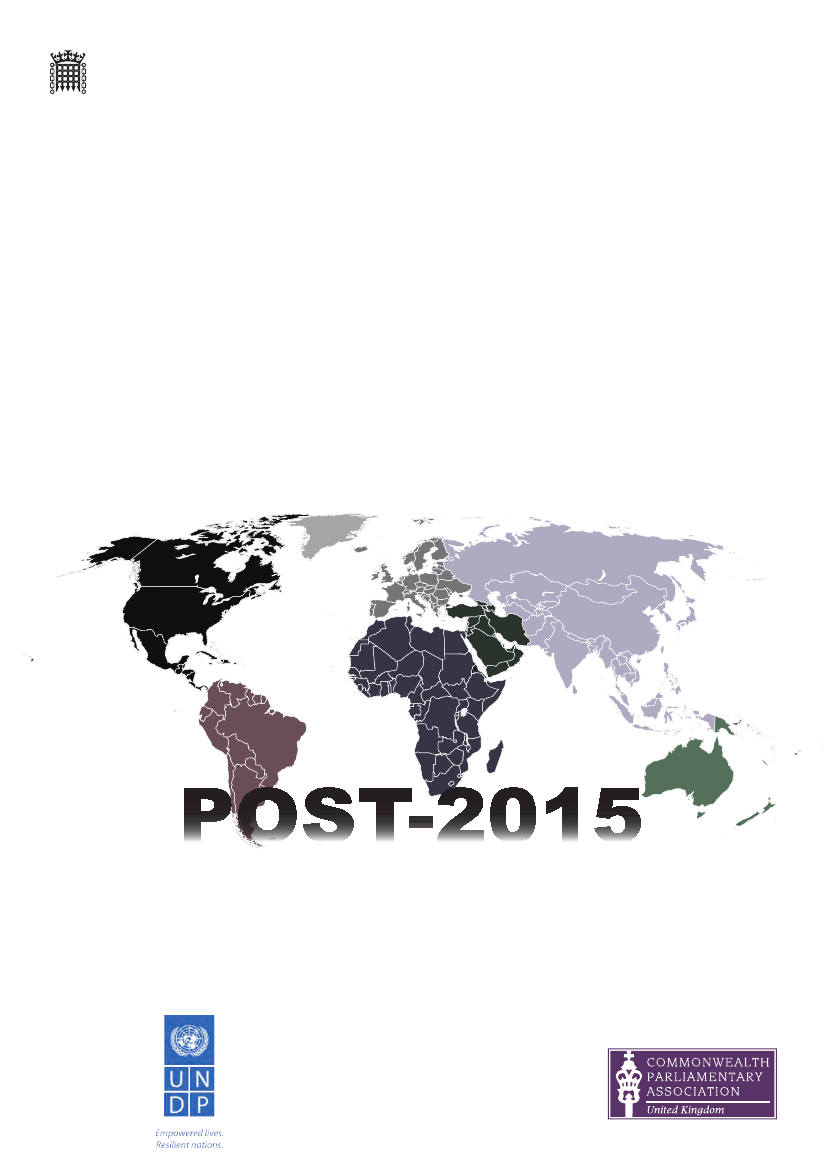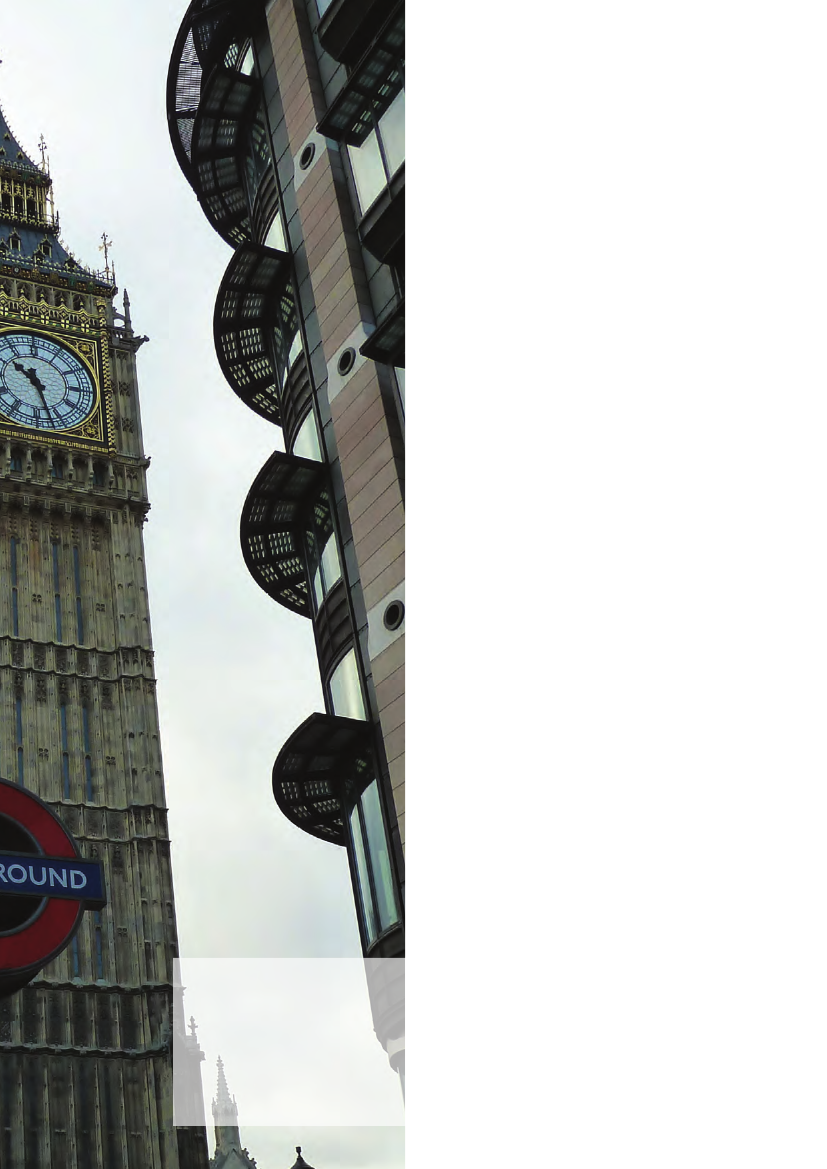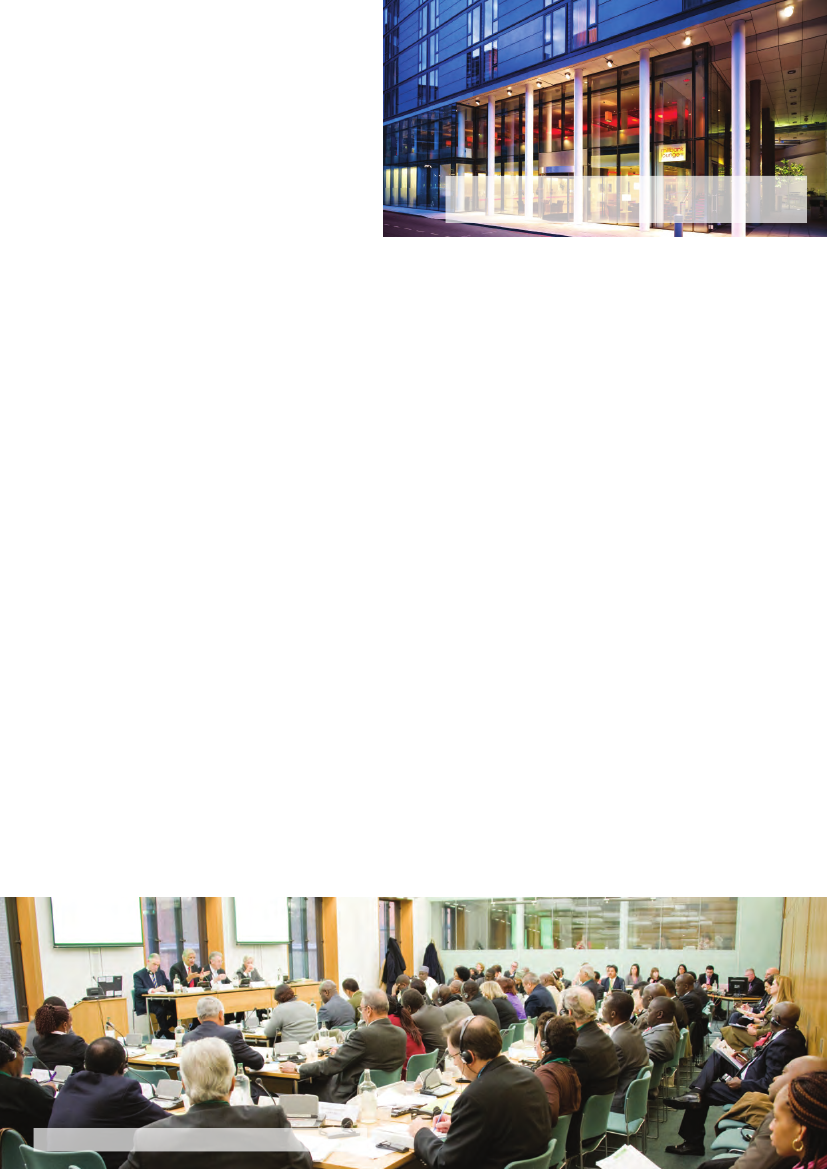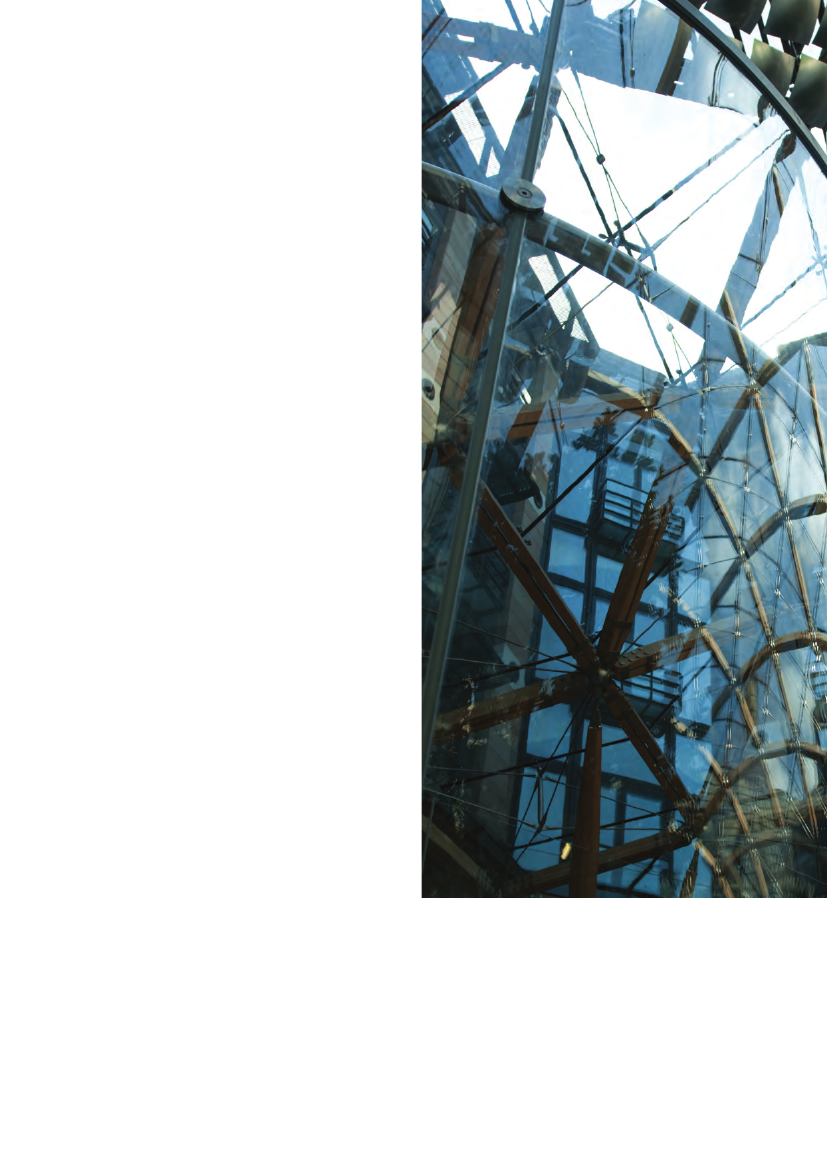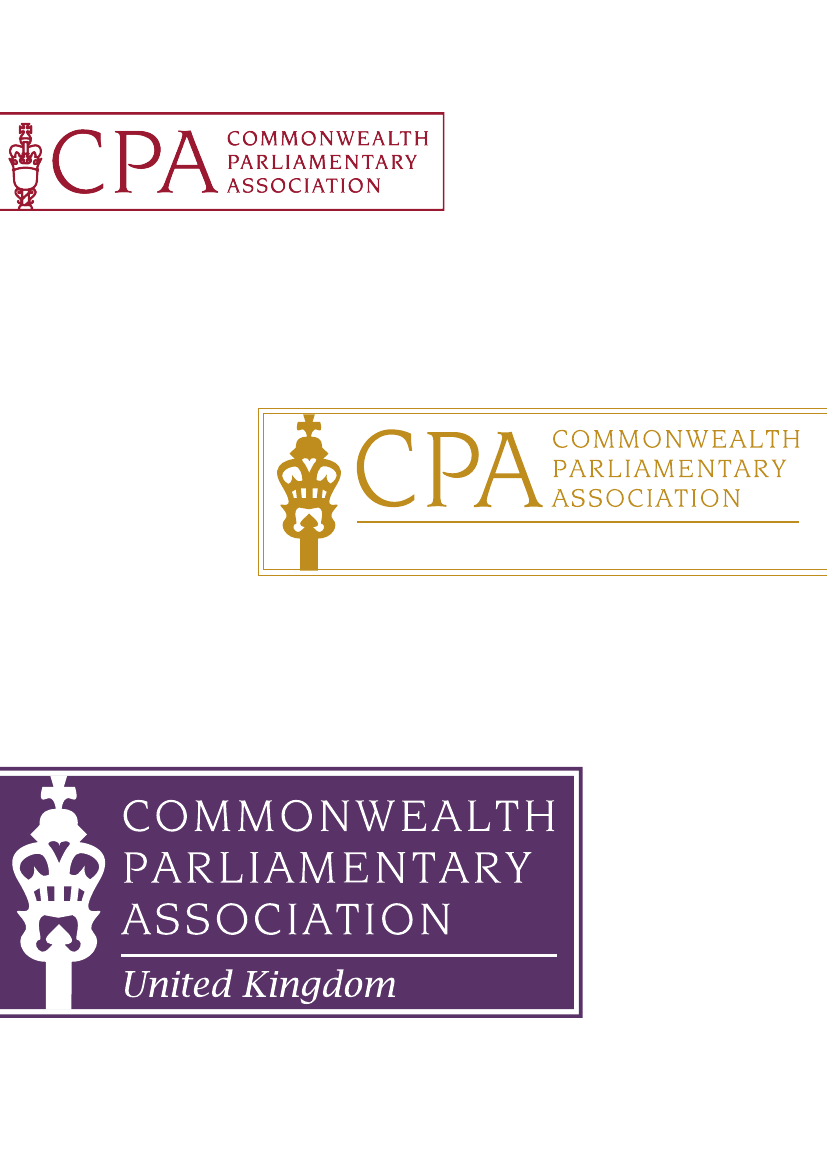Udenrigsudvalget 2012-13
URU Alm.del Bilag 212
Offentligt
HousesofParliamentHousesofParliament
InternatIonal ParlIamentary ConferenCe
Post-2015 DeveloPmentagenDa25 - 29 november 2013houses of ParlIament, lonDon
on the
MILLENNIUM DEVELOPMENT GOALSEDUCATIONGOVERNANCECHILD MORTALITY EXTREME POVERTYEMPLOYMENTHUNGER DEBT
ENVIRONMENT HIV/AIDS GENDER TRADE WATER INVESTMENT
UN HIGH LEVEL PANEL
GLOBAL PARTNERSHIP HEALTHCHANGEFOODRESILIENCECLIMATEPRICESSUSTAINABILITYTBMALARIA
TRANSFORMATION DEVELOPMENT
EQUALITY
Supported by:
InternatIonalParlIamentary ConferenCeon theDeveloPment agenDa25 - 29 november 2013houses of Parliament, londonThe Millennium Development Goals (MDGs) are due to expirein 2015, and attention is now turning to what should replacethem. A UN High-Level Panel of Eminent Persons (HLP) wasconvened in July 2012 by the UN Secretary-General; co-chaired by British Prime Minister Rt Hon. David Cameron MP,President Yudhuyono of Indonesia and President JohnsonSirleaf of Liberia. The panel was asked to look beyond2015 to establish a universal agenda that would lead to theglobal eradication of extreme poverty. The 27 strong panelpublished their recommendations in May 2013 in a reportentitled: A New Global Partnership – Eradicate Poverty andTransform Economies through Sustainable Development.Outlining a new set of development goals and indicators,the report places sustainable development, transformativeeconomies, peace building and global partnerships at thecore of the post-2015 rhetoric.Parliamentarianswere“...parliamentariansinvolved in the creationcan...ensure theof the report, and theredevelopment,is some recognition oftheir role, and the role ofimplementation andparliaments, in advancinglongevity of thethe new developmentagenda. It is clear thatpost-2015 goals”parliamentarians can playan even greater role thanhas been envisaged to date to ensure the development,implementation and longevity of the post-2015 goals.Following on from the success of the InternationalParliamentary Conference on the Millennium DevelopmentGoals (IPCMDGs): Reaching for 2015: Governance,Accountability and the Role of the Parliamentarian inNovember 2011, CPA UK, with support from the UnitedNations Development Programme, is now turning itsattention to developing an International Conference thatfocuses on the future of global development indicators.During the period of Monday 25 – Friday 29 November 2013,CPA UK will host the International Parliamentary Conferenceon the Post-2015 Development Agenda (IPCP2015) at theHouses of Parliament, London. We are delighted to inviteyour legislature to apply for up to two parliamentarians toparticipate in the conference. Theconference programme will last“The conference...will bring togetherthree days and will bring togetheran audience of internationalan audience of internationalparliamentarians and high profileparliamentarians and high profileexperts from international andnon-governmental organisations,experts from international and non-civil society groups and academiagovernmental organisations, civilfrom commonwealth and non-society groups and academia.”commonwealth countries.
Post-2015
AimTo build the capacity of parliamentarians to ensurethat governance, transparency and accountabilityas necessary contributors to good developmentoutcomes are at the core of the post-2015development debate.ObjecTivesA set of supporting and interlocking objectivesdesigned to:The Doubletree by Hilton, Westminster Hotel. One of the top hotelsin the vicinity of the conference venue.
1. Inform parliamentarians of the current UNprocesses of the post-2015 development agenda by increasing the understanding of the High-Level Panel Report andoutlining the outcomes from the United Nations MDG Review Summit.2. Advocate for the continued involvement of parliamentarians in shaping the post-2015 development agenda.3. Encourage discussion between parliamentarians on thematic and regional issues to identify the key challenges to beaddressed in the post-2015 debate.4. Examine what contribution good governance and the rule of law can make to development outcomes; how it can bemeasured and what targets should be included in the post-2015 development agenda.5. Explore the mechanisms that parliamentarians can use to hold governments to account to ensure that internationalcommitments to development are implemented at a local, national and regional level.6. Analyse options for a global accountability and monitoring framework to ensure transparency and best practicepermeates the implementation and measurement of all development indicators.7. Examine how to strengthen inter-state, regional and global mutual accountability so that compliance is self-reinforcing.8. Consider how the Commonwealth and other international and regional organisations might contribute to the post-2015 development agenda.9. Explore opportunities in which parliamentarians can build partnerships with civil society, the private sector, multi-lateralinstitutions and marginalised groups to promote and deliver the post-2015 development goals through the policymakingprocess.10. Examine how parliamentarians can scrutinise the work of civil society, the private sector and international donors toensure that it is aligned with the post-2015 development goals.OuTpuTsTo produce:1. A conference communiqué highlighting priority issues for parliamentarians for presentation at the United Nations.2. A toolkit for parliamentarians to assist delegates to influence, implement and monitor the post-2015 developmentagenda.CPA UK and UNDP will work to:3.4.Establish a set of recommendations from the IPCP2015 to be submitted to the High-Level Panel.Promote, alongside other partners, the international debate on governance in the post-2015 environment.
Opening session of the IPCMDG Conference, 2011, London
prOgrAmme OuTlinemonday 25 november:Official arrival day and welcomereception
Tuesday 26 november:Conference Day 1contextualising the post-2015 Development AgendaAs the 2015 deadline for achieving the MDGs is rapidly approachingthe international community has begun debating the next stagein global development indicators. This year is shaping up as animportant period in the post-2015 debate with the UN Secretary-General, Ban Ki-moon, expected to present his vision for the post-2015 development agenda based on the work of the HLP at theUN General Assembly Special Event on the MDGs in September.This event will advance thinking on the post-2015 agenda byreviewing the current status of and continued progress towards theachievement of the MDGs as well as examining lessons learned. Inaddition, the UN General Assembly Open Working Group (OWG)on Sustainable Development Goals plans to release an interim areport in September 2013 and submit their final report at the 68thSession of the United Nations General Assembly by September2014. Although the process of arriving at a post-2015 frameworkis UN led, broad participation from external stakeholders in civilsociety, the private sector, academia and politics must provide thebackbone to the debate.
Wednesday 27 november:Conference Day 2strengthening AccountabilityLack of accountability has been identified as a major weaknessin the implementation of the MDGs. Momentum is building foraccountability issues to have a greater profile in the post-2015development agenda. In response to this the introduction of aglobal monitoring and peer review framework, which would ensuretransparency and enhance cooperation so that the internationalcommitments are met, is fast gaining traction in the post-2015rhetoric. Parliamentarians play a key role in monitoring and holdingtheir executives to account in upholding their international,regional and national commitments. Parliaments must become thepillars of accountability in monitoring their governments throughrepresentation, lawmaking, budgeting and oversight functions.
Thursday 28 november:Conference Day 3building partnershipsA central theme of the High-Level Panel Report was the forgingof renewed global partnerships with a fresh vision and frameworkbased on common humanity and principles of universality, equity,sustainability, solidarity, human rights and the right to development.Parliamentarians are an important link between governments andkey stakeholders in civil society and the private sector, ensuring allvoices are given an equal platform in advocating for and contributingtowards the post-2015 development debate. Parliaments must alsopay particular attention to and advocate for marginalised groups toensure that their views are represented and reflected in the post-2015 development goals.
FurTher inFOrmATiOnWebsite:www.parliament.uk/post2015Email:[email protected]Contact No.:Tel: +44 (0) 207 219 5373Fax: +44 (0) 207 233 1202
Friday 29 november:Official departure day/supplementaryone-day seminar (optional)
ApplicATiOn prOcessNational Legislatures may apply for a maximum of two placesfor parliamentarians. To apply for places at the conference,please complete the enclosed Delegate Nomination Formand return it to CPA UK as soon as possible and by no laterthan1800 gmTonmonday 2 september 2013.Anyapplication for a place received after the deadline is unlikelyto be successful.Delegate places will be awarded ona first-come-first-served basis; your legislature istherefore encouraged to apply for places as early aspossible.Nomination CriteriaWhen selecting parliamentarians for nomination, you arerequested to consider that:• It is CPA UK policy to encourage broad participation inits events. Where possible please nominate Membersfrom both government/majority parties and opposition/minority parties, and consider gender balance and youthrepresentation when nominating• The conference is aimed primarily at those Memberswith an interest and experience/knowledge of thesubject matter• Delegates should have a reasonable expectation ofcontinuing in their parliamentary careers so that theirparticipation in the conference is worthwhile both tothemselves and to their parliament• Delegates are expected to arrive for the start of theprogramme and to participate fully to its conclusion.Legislatures should nominate only delegates who willattend the entire programmeNotification of Delegate PlacesCPA UK will inform legislatures of the outcome of applicationsfor delegate places during the week beginning9 september2013.We regret we are unable to answer queries aboutapplications before this date. For those countries that requirevisas to enter the UK, it is advisable to apply for them as soonas possible after receiving confirmation of delegate places.Please note, CPA UK cannot assist in the visa applicationprocess.Delegate DataBiographical details, a digital photo, travel/accommodationdetails and any particular dietary requirements for eachdelegate attending the conference will be required. Formsfor completion will be issued with the notification of delegateplaces and must be completed by27 september 2013.
ADminisTrATiOn & lOgisTicsAccommodationDelegates will be responsible for booking and paying fortheir own accommodation. Details of the official hotel willbe issued to all successful legislatures when they are notifiedof their places. The hotel will be in the immediate vicinity ofthe Houses of Parliament.FundingDelegates will be responsible for:• Booking and paying for their accommodation• Paying a delegate feeA fee will be charged to cover the costs ofdelegates’ official meals and functions, materials andtransport. As a guide, the delegate fee – excludingaccommodation costs - for attending the conferencewill be approximately £200.00. Exact fees will beinvoiced and must be paid before the event• Travel to and from the UK• Travel to and from the UK point of arrival and the Londonhotel• Lunches and evening meals – except those annotated aspart of the official programme• Personal expenses during the conference period (laundry,telephone, room service, mini-bars, DVDs, etc)Spouses/Accompanying Persons/ChildrenSpouses, accompanying persons and children are not invitedto the conference programmes. There are no exceptions tothis rule.Withdrawals/Cancellations/LiabilitiesLegislatures are requested to inform CPA UK immediately if adelegate cancels, or if for any reason will not arrive in Londonas scheduled. Once legislatures have committed to delegateattendance and arrival details have been received, anycancellation fees or liabilities incurred by CPA UK as a resultof a delegate failing to arrive or departing early will be passedto the nominating legislature Branch for reimbursement toCPA UK. Cancellations received between 7-1 days prior tothe day of arrival, or on the day of arrival will result in acancellation charge of 100% of the accommodation costsincurred.
We look forward to welcoming your delegate(s) to this important and valuable event.
Rt Hon. Sir Alan Haselhurst MP
Chairperson, CPA International & CPA UK Branch Executive Committee
The cOmmOnWeAlTh pArliAmenTArY AssOciATiOnEstablished in July 1911, the Commonwealth Parliamentary Association (CPA) is an active network of over 17,000parliamentarians from Commonwealth Parliaments and Legislatures. Through dialogue, it seeks to foster co-operation andunderstanding between Parliaments, promote good parliamentary practice and advance parliamentary democracy. EachCommonwealth legislature that joins the CPA is invited to form an autonomous CPA branch be it a national, state, provincialor territorial legislature. A truly global body, the CPA currently comprises 175 branches throughout six continents and 53countries across the world.cpA uKCPA UK is one of the largestand most active branches in theCPA community and deliversa unique annual internationaloutreachprogrammeinWestminster and overseas.CPA UK works to encourageBRITISH ISLANDS & MEDITERRANEAN REGIONparliamentary diplomacy andbuild parliamentary capacityon behalf of the UK Parliamentand the wider CPA. Throughactivities such as conferences, seminars, delegations and parliamentary strengthening teams, CPA UK provides Memberswith a practical, current and first-hand perspective on international issues facing fellow parliamentarians across theCommonwealth. Working with CPA UK’s international outreach programmes also enhances Members’ understanding ofissues facing diaspora communities in their own constituencies.The CPA UK offices are located at Westminster Hall, Houses of Parliament, London SW1A 0AA.T: +44 (0)20 7219 5373F: +44 (0)20 7233 1202Facebook: www.facebook.com/pages/CPA-UK/Twitter: @CPA_UK
